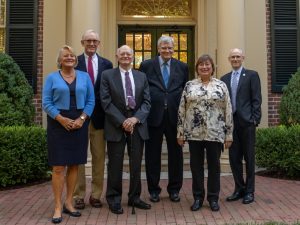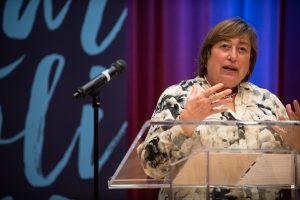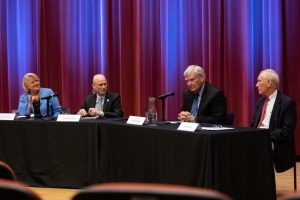2021 AAD Sisco Memorial Forum: The Role of Diplomacy in Addressing Climate and Water Issues
October 1, 2021UNC Global Affairs

From left to right: Barbara Stephenson, Kenneth Brill, Ronald Neumann, Brian Atwood, Catherine Novelli, and Aaron Salzberg. (Photo by Jen Hughey/UNC-Chapel Hill)
During the annual Joseph J. Sisco Memorial Forum, “Preserving Life: Climate Change, Water, and Diplomacy,” leading foreign affairs practitioners discussed the role of diplomacy in generating the international cooperation needed to address climate and water issues. The event, hosted by the American Academy of Diplomacy (AAD) in collaboration with the Office of the Vice Provost for Global Affairs (OVPGA) at the University of North Carolina at Chapel Hill, was held in the Nelson Mandela Auditorium of the FedEx Global Education Center on Sept. 9, 2021.
Ambassador Ronald Neumann, president of the AAD and former U.S. ambassador, and Barbara Stephenson, vice provost for global affairs at UNC-Chapel Hill and former U.S. ambassador, gave a joint welcome and introduced keynote speaker Ambassador Catherine Novelli. In their introduction, Neumann and Stephenson stressed the theme that addressing major transnational issues such as climate change requires international cooperation, and it is diplomacy that delivers international cooperation.

Novelli– who formerly served as undersecretary of State for economic growth, energy and the environment; assistant U.S. trade representative; and vice president for worldwide government affairs at Apple–highlighted the existential threat posed by climate change to human existence and described how, with effective diplomacy, we can pull together to take effective action to address that threat.
“These issues don’t just stop at a border,” Novelli said.
Novelli emphasized the need for political will in the fight against climate change and said the 2015 Paris Climate Accords exemplify how diplomacy can create lasting results and bring countries together to address shared concerns. She encouraged everyone in the room—no matter their background—to join the effort to fight climate change.
“We need you to be diplomats, we need you to do outreach to convince people to think creatively, to do what’s needed to meet this challenge,” Novelli said. “Do not lose heart and do not lose hope.”
A panel discussion, moderated by Stephenson, followed Novelli’s keynote.
The panel of experts included:
- Brian Atwood, former administrator of USAID and former undersecretary of State for management;
- Ambassador Kenneth Brill, former acting assistant secretary of State for the Bureau of Oceans and International Environmental and Scientific Affairs, and former U.S. ambassador to Cyprus, the International Atomic Energy Agency and the U.N. Office in Vienna and acting ambassador to India; and
- Aaron Salzberg, director of UNC’s Water Institute, Don and Jennifer Holzworth Distinguished Professor in the Department of Environmental Sciences and Engineering at the UNC Gillings School of Global Public Health, and formerly the first special coordinator for water at the U.S. Department of State.

Brill set the stage by explaining the State Department’s role in environmental and climate diplomacy.
“Bilateral diplomacy is integral to environmental policy,” Brill said, noting how the State Department’s work on finding common ground between countries is what ultimately allows climate negotiations to produce results.
Atwood explained how important water—which is heavily impacted by climate change—is to national security. He said a report by the intelligence community found that in the next 10 years, many countries important to the United States will experience water problems that will risk instability and state failure and increase regional tensions.
Salzberg dove into the future of those problems.
“By 2030, more than 40% of the world’s population will be living under water stress conditions, including more than a billion people who will not have enough water to be able to meet their domestic economic and environmental needs,” Salzberg said. “Countries will become more fragile and will fail if they don’t get the water equation right.”
While water stress can cause conflict, Salzberg said, water itself can be used to promote democracy in diplomacy. He said when people come together over a shared interest in clean water, it can be an opportunity for diplomats to promote wider notions of democracy.
“It is a diplomatic tool to advancing our broader foreign policy interests,” Salzberg said.
Atwood said that ultimately, trust is key in foreign relations.
“You achieve that trust through diplomacy,” Atwood said.
The annual forum is part of a larger partnership between the OVPGA and the AAD, which includes collaboration on the production of the podcast series The General and the Ambassador, as well as programming that enriches the University’s new Diplomacy Initiative.
The AAD is an independent, non-profit association of over 300 former senior U.S. ambassadors and high-level government officials who have served with distinction in international affairs. AAD’s mission is to strengthen American diplomacy through outreach programs, awards, podcasts, research and public discussions, like the Joseph J. Sisco Memorial Forum.
This programming is organized by the AAD and the OVPGA at UNC-Chapel Hill. This event was presented with generous support from the Sisco Family Charitable Fund.
A recording of the event can be found on UNC Global’s YouTube channel.
